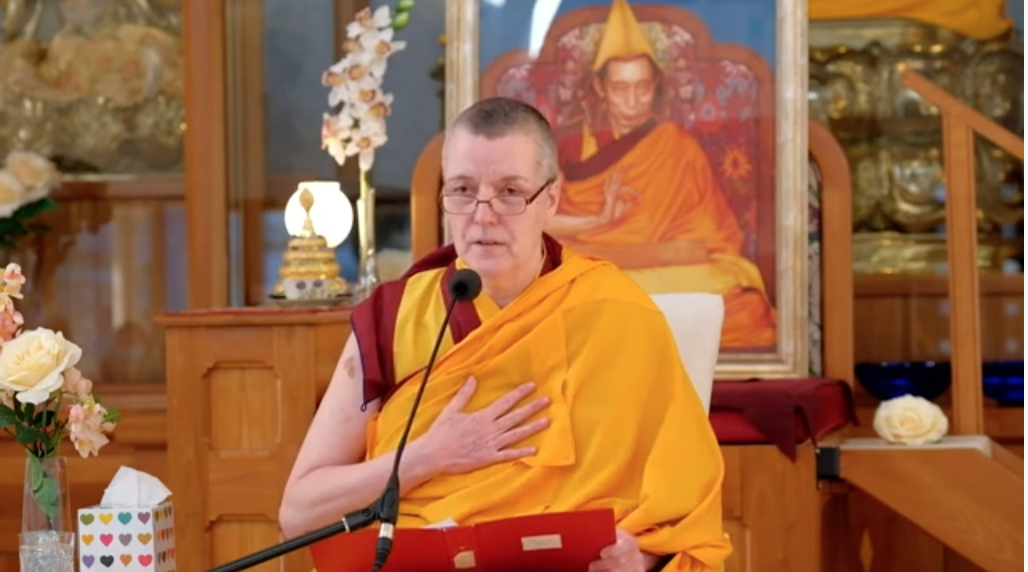Working with the Five Remembrances
What do you want to carry with you when you go? The post Working with the Five Remembrances appeared first on Tricycle: The Buddhist Review.

The climate rages planet-wide. Empty waterways warn of coming hunger. Floods swallow towns whole. Fires consume state-sized swaths of land, land and all its creatures. As this world careens into chaos, as hatred grows and kindness shrinks, as we all burrow down into our conflicting, agreed-upon beliefs—it becomes crucial to revisit the Five Remembrances. Here they are, loosely translated:
I am of the nature to grow old. I cannot escape old age.I am of the nature to grow ill. I cannot escape sickness.
I am of the nature to die. I cannot escape death.
I will be separated from everything and everyone I hold dear.
My only true possession is my actions.
Puts everything in perspective, doesn’t it?
These five verses from the Upajjhatthana Sutta form what might sound like really terrible news for the untrained ear. I mean, buzzkill after buzzkill. But the truth is, these form the pathway to liberation itself.
When I use these Five Remembrances as a first practice every morning, I move through each day with so much more presence, ease, and equanimity. I’m not saying I’m “there.” But thinking about these verses before I get out of bed helps me cultivate their spirit. It guides me around their neighborhoods—which I’d like to do for you, now.
1. I am of the nature to grow old. I cannot escape old age.
I used to think that aging gracefully meant things like: I would move more slowly because I chose to, not because my back was killing me. Or, I would stop worrying about everything because I was wise, not because suddenly “everything” disappeared from my brain.
But I was wrong. Over the past thirty years, I’ve dealt with multiple surgeries, seizures, stuttering, memory lapses, and a concussion that altered my sense of balance forever. Now, as I approach my 68th birthday, I realize that aging gracefully means being willing to deteriorate in real time without anesthesia. It means just saying yes to what is—not spending money on balms and Botox to hide it. I can stop beating myself up or working myself into the ground to fool everyone into thinking I’m 45. It’s like, ahhh. I can be 68. It’s good. This is life living itself through me.
This first remembrance helps me bow to the whole sky-wide sunset of my age, the drowning of the day, the deepening of the dark, and the wrinkles and the spots on my skin.
2. I am of the nature to grow ill. I cannot escape sickness.
Just remembering this simple fact can lessen our suffering when we do fall ill. We catch a cold, or the flu. Or something scarier, maybe. I’ve been through Lyme disease. I suffered a very serious nervous breakdown. I’ve had chronic bronchitis. When we’re born in a human body, we are probably going to be sick in some small or big way, at some point in our lifespan. It’s ok. It’s part of our nature. We cannot escape it. Life is living itself through us, and that is what it looks like sometimes.
3. I am of the nature to die. I cannot escape death.
This one. Boy oh boy. We live in such denial. Every day, we move around like we’re going to live forever. Ages to go! But the truth is, any of us could be hit by a truck today. How does it feel to think about that one? Think about it.
Do you feel a shift?
Jack Kornfield once shared during a teaching that when he leaves the house, he takes a moment to look at his wife mindfully—to let it sink in that, for whatever reason, he might never see her again. As I think about practicing in this way, I feel cracked open. And surprisingly, it’s not morbid at all. It’s more like—if you’ve only ever seen a photograph of the ocean, but now you’re standing on the shore with your feet sucked into the sand as the waves retreat before pummeling into you again. You can smell the salt and feel the water and the wind and it’s all just so… real. That’s how it is to hold the fact of death in your back pocket.
Still, there’s no need to overthink it. The Grim Reaper does not have to be your screensaver. But, you know, have coffee with the guy every now and then. Know that death is built into our program. That way, you won’t waste so much of your life trying to outsmart it.
4. I will be separated from everything and everyone I hold dear.
This is true without exception. Either because they change or they die, or I change or I die. It’s all going away. But this does not need to be cause for sadness. This can be cause for unconditional appreciation. Joy, even.
For example, if a messenger from the future came and told you, “Today is the very last day you’ll see a daisy (or play with your dog, or listen to music… you get the idea),” how precious would that element in the world be all of a sudden?
If we’re going to be separated from everything we hold dear—how much gentler might we be with our possessions? How much more respectful? If we can recognize that this is all a fleeting gift from the universe, and we have no idea how long we get to keep it, wouldn’t we treat everything that passes through our hands, our ears, and our lives with a little more appreciation?
5. My only true possession is my actions.
The only thing I can take with me, when I go, is my actions. If I hold this in my heart every morning, it sets the tone for my day in a way that nothing else can. Once I know that I will absolutely grow old, get sick, and die, and that I’ll for sure be separated from everything and everyone I love… what’s left? My actions.
Everything I do carries weight. Everything I do matters. But not in that oppressive sense of Everything-Will-Be-My-Fault-If-It-Goes-Wrong. It’s more like everything I do comes front-loaded with consequences. And, since I’m going to carry them with me, I get to choose what they are.
So, say I’m on my way out the door of this life, having lost everything—my home, my family, my friends, my sanity, my ability to keep from soiling myself. I’ve lost it all. And on my way out, I have to take everything I’ve done. Everything I’ve said. Seeing it like this gives me an intimate relationship with my actions that shapes how I live in the moment.
Do I really want to fill my luggage with these snarky comments about someone we all agree is an idiot? Probably not. Not the thoughtless sarcasm, either, or the lying, the yelling, or the betrayals large and small. It would be like lugging around a big box of rocks.
If I’m going to carry everything I’ve done, I want to pack that second of silence, when I didn’t spit back an angry retort during an argument. I want to tuck in my side pocket that time I let someone cut into the traffic even though I was in a hurry. I want to make sure to pack that particular morning of spaciousness I offered my wife so she could just be who she is, unimpeded. That’s what I want to carry.
What about you? What are you going to do today, now that you know you’ll have to carry it all with you when you go? Pack smart, is all I’m saying.

 UsenB
UsenB 
































